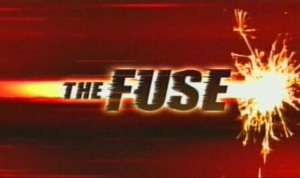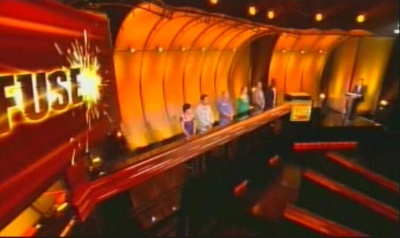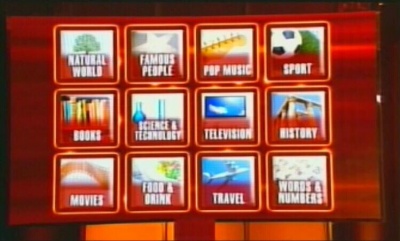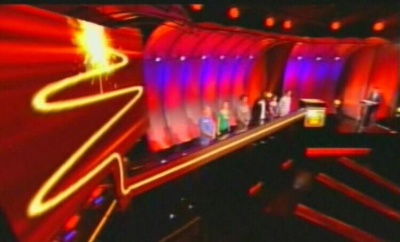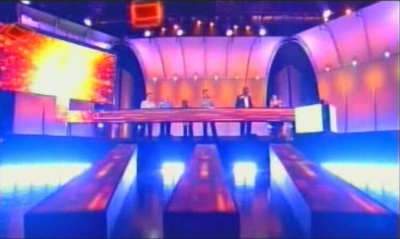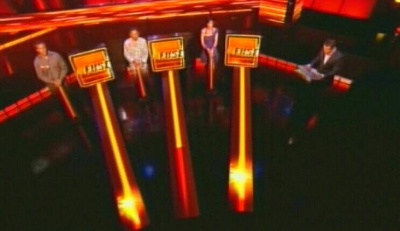The Fuse
Synopsis
"Austin Healey presents The Fuse - an explosive (see what they did there?) new daytime quiz show on ITV1." So begins the ITV Press Release on the second of their two-week quiz show trials at 5pm (hot on the heels of The Chase), and it instantly poses two questions:
1) Does the fact that Austin Healey's a rugby player mean he's probably not going to be a fantastic quiz show presenter? 2) Is the show going to be filled with 'fuse'-related puns?
The answer to both, unfortunately, is 'yes'.
The show features six contestants who can be described (if we're being kind) as 'lively'. (It seems whoever was in charge of contestant recruitment had seen Deal or No Deal and decided that lots of squealing, hyperactive, and not particularly bright adults is precisely what we want to see on a teatime game show.)
It also features 12 'boxes' (subject categories), within each of which is one of 12 sums of money (ranging from £1 up to £5,000). The team's job is to try and 'save' these sums of money by stopping the boxes being 'exploded', which tends to happen when the fuse burns for too long. Unfortunately the 'boxes' are actually just squares on a big screen, and we don't get to see any actual explosions, although if you get excited by stock explosion graphics, then this is for you.
So how do the team save the money? By answering questions of course! The games begin with 6 in a Row which, as the name suggests (regardless of how familiar you are with Going for Gold), requires six correct answers in a row. The team stand in a line and one contestant goes and has a chat with Austin, which is usually a bit awkward, and a bit weird, but often amusing for precisely these reasons. They then select a category (a 'box') which becomes the subject for that round. The fuse gets lit (cue some spangly graphics) and the team have two minutes to get six in a row, starting from whoever happens to be at the end of the line, and going back to them if the chain is broken. There are two 'lifelines' in this round - a player can shout "Confer!" if they're stuck and think their teammates can help, and the person who chose the subject can shout "Quickfire!". When this happens Austin will ask a list-style question ("Name six of the seven dwarves", "Name six continents") and the team have to try and do so (keeping in the order as before, and with no conferring). Whilst this is happening the fuse is still burning, although a failure here usually means failure for the round, since it's (usually) only deployed when they're running out of time anyway.
If the team manage six in a row, then hooray, the money is safe, whereas if they fail the box is 'exploded' and the money is lost. Austin then attempts to ramp up the tension whilst we wait to find out which sum has been saved or lost, and there's usually a bit of squealing and clapping regardless of the result.
This whole process is then repeated a further five times (so each team member gets a chance to be the subject picker), with the time available reducing from round to round. Eventually they'll have eliminated six 'boxes', and six sums of money, and usually have saved some for the kitty as well. You will have noticed that the person who picked the box may not ever answer a question if their teammates are rubbish, which they usually are, which seems like a big flaw to us.
For the next round, the players pick subjects (ostensibly for themselves) in reverse order to the order they picked in the first round. Then the two players who performed 'best' by answering the most questions correctly across the first round get to choose, school PE lessons/football team picking-style, their opponents for the next round, leaving two groups of three to battle it out in the next round.
In Burnout, each contestant has a 90-second fuse, and to start with they're all unlit. Austin asks questions from the three players' chosen subjects, rapid fire (and on the buzzer) style, and a contestant can then light another player's fuse by answering one correctly. For most of the round there will be two lit fuses and one unlit one (or sometimes three lit), and the following rules apply:
- If your fuse is lit and you get a question correct, your fuse stops burning and whoever's isn't starts. - If your fuse is lit and you get a question wrong, you lose 10 seconds from your fuse. - If your fuse is unlit and you get a question right, your fuse stays unlit whilst the others keep burning. - If your fuse is unlit and you get a question wrong, your fuse starts burning.
As you'd expect, this amazingly clunky process goes on until two fuses burn out (Burnout, geddit?) and one person is left. They proceed to the next round, along with their subject, and the other two players (and subjects) leave the game. Teasingly, we don't get to find out what money was in these eliminated boxes. Why nominating a fuse at the start is required is unknown - surely it would have been simpler if both your opponents' fuses start burning if you get the first question right?
Burnout is then played with the other three players, and the winners of these two contests then face off in Firefight (geddit??). This round is similar to Burnout, although now the contestants have just 60 seconds on their fuses. Both start lit, and once someone answers a question correctly their fuse stops burning and the other player receives all the questions until they get one right, stop their fuse burning and light their opponent's (basically Grand Slam, but with more explosions (well, one more explosion)). This goes on until one player runs out of fuse, leaving the other, and their box, to face The Final Fuse.
First off, we get to find out what was in the subject (box) the contestant had been defending up until this point, and this gets added to the money won by the team in the 6 in a Row rounds. This is where Austin's claims of "prize money of up to £50,000" finally make sense, in a slightly odd twist on the game show fad of promising huge sums of money which are almost impossible to come close to winning. The money currently in the prize fund is in fact the lowest that can be won (other than nothing, of course), with double, or even three times this available.
The Final Fuse is a simple matter of answering six questions within a time limit. Do it in 70 seconds and you take the prize fund as it was collected on the show, do it in 60 seconds and you win double it, do it in 50 and you win treble. The questions in the final round are general knowledge (not, as you might expect, on whatever subject the player had 'defended' through to the final).
So how does the show stand up? It certainly feels like a new production, the presenting is a little awkward - Austin's contestant chats are usually a little stilted, and whilst he's not helped by the producers' insistence on a (sand?) bucket of puns ("two of you are going to be blown out of the game for good"), you feel they could be rescued with better delivery (for instance, most rounds start with "Are you ready to fight the fuse?" "Let's light the fuse", but he doesn't think there's any need to put some stress on the word 'light'). They also either need a (possibly canned) audience, or at least some clever work with sounds and music to make up for the rather empty sounding studio - a good case in point is when the final box's value is revealed, and all you hear is Austin and the finalist clapping a bit.
But production aside, what about the format? The 6 in a Row round, though alright to watch, goes on for a little too long, taking up around half the show and being fairly repetitive. The Burnout and Firefight rounds are potentially the most exciting rounds in the programme, but make up a fairly small part, time-wise. How they determine the two 'best' contestants from the first round is also a little dubious, but confers a fairly real advantage (unequal round lengths, as well as the chance involved in whether your team happens to do well when you're in the first question position means whoever answers the most questions correctly may well be flattered by this statistic). There's also some issues with consistency of question difficulty. Whilst, say, The Weakest Link manages fine by having the "What part of the human body begins with E and rhymes with 'Beer'?" questions in the opening round, before making it a little harder towards the end, The Fuse takes more of a mix 'n' match approach. (Two 'Quickfire' questions in the first episode were "Name six members of the Von Trapp family" and "Name six current Smarties colours" - you can probably guess which one the team managed.)
The game also has some potentially interesting tactical element in terms of subject selection in the opening round. A player should arguably save a subject they're strong on for the later rounds, where they can gain a bigger advantage from it, but at the same time they want to pick something they think the team will do well with. The presenter could draw attention to this, which might make it more interesting for the casual viewer, rather than having contestant after contestant picking a subject they like in the opening round because they haven't thought about it properly. Whilst we're on the subject of, er, subjects, it also seems a little odd to not make the topic they pick at the halfway stage the subject of the questions for the final, especially when such a fuss is made of them 'defending' it to the end.
All in all, though, it's a fairly watchable programme. You get plenty of questions, the pacing is good, and there's not too much time wasted trying to build up tension, which is a refreshing change. Similarly, the fact the focus is primarily on the lowest prize money, rather than an improbably obtainable maximum is an interesting departure from what we think of as a 'new' fad, but has probably been going on for donkeys' years. Whilst enjoyable, each element is something that has been seen numerous times before, so if innovation is your thing you won't find it here.
It will be interesting to see if they can polish up the production - if they do it could perhaps move to something that is just a little above average (or at least what is 'average' these days).
Catchphrases
"Are you ready to fight the (final) fuse?" "Let's light the (final) fuse!"

